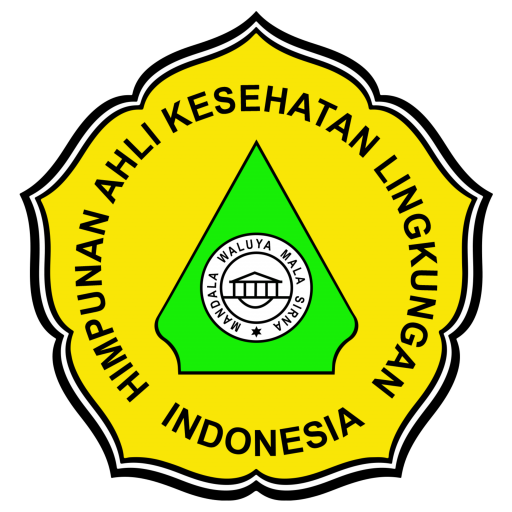PENGARUH PENGATURAN DEBIT INLET IPLC DENGAN PENURUNAN KADAR AMONIAK (NH3) PADA IPLC RSUD AJIBARANG KABUPATEN BANYUMAS TAHUN 2016
Abstract
Hospital liquid is the most potential resource of water pollution. The hospital wastes which contain
amoniac will cause several environmental problem such as eutrofikasi and an indication of organic mixture
pollution which contain nitrogen. The goal of this research is to analizing the affect of IPLC RSUD Ajibarang. Inlet
debit control with the decreation of amoniac rate at IPLC RSUD Ajibarang. The IPLC inlet debit control research
as 74,5 ltr/mnt, 68,5 ltr/mnt and 62,5 ltr/mnt. This kind of research is a pre eksperiment with pre and post test
design approach. The collection of data been done by checking the amoniac rate of laboratory.The data presented
in table and structural narration. Data analization is using kruskal wallis statistik identification to identify the
difference of decreation amoniac rate with the control at inlet debit which is 74,5 ltr/mnt, 68,5 ltr/mnt and 62,5
ltr/mnt.The result of the research gained is the rate amoniac IPLC RSUD Ajibarang with the control of inlet debit
IPLC 74,5 ltr/mnt shown approximately 0,093 mg/ltr, inlet debit IPLC 68,5 ltr/mnt shown approximately0,075
mg/ltr and inlet debit IPLC 62,5 ltr/mnt shown approximately0,050 mg/ltr. The edge point of amoniac is suitable
with the city regulation in Central Java Province No. 5 2012 at 0,1 mg/ltr. The test result is kruskal wallis
significant point at 0,000 < 0,05 (grade α) that lead Ho to an discharge of Ho or there is a decreation of amoniac
rate with IPLC inlet debit control to IPLC RSUD Ajibarang liquid waste. Summarized by the researcherthat there
are significant decrease influence of amoniac rate at the control at IPLC RSUD Ajibarang inlet debit. The most
effective to reduce amoniac rate is with the IPLC inlet debit 62,5 ltr/mnt. Suggested to the hospital’s Management to
accomplish the research result to reduce the amoniac rate in liquid waste
Keywords
Full Text:
PDFReferences
Alaerts, G, dan Sri Sumestri Santika, 1984, Metoda
Penelitian air, Surabaya : Usaha Nasional
Betty Sri Laksmi Jenie Winiati Pudji Rahayu, 1993,
Penanganan Limbah Industri Pangan,
yogyakarta : Kanisius
Nur Cholis Majid, 2011, Pengaruh Konsentrasi
Kaporit Terhadap penurunan Kadar
Amoniak (NH3) Pada Limbah Cair Rumah
Sakit Emanuel Purworejo klampok
Kabupaten Banjarnegara, Karya tulis ilmiah
: Politeknik Kesehatan Kementrian
Kesehatan Semarang
Nusa Idaman Said, dan Ineza, 2002 Uji Performance
pengolahan Air limbah Rumah Sakit dengan
Proses Biofilter Tercelup, Jakarta : BPPT
Rukaesih Achmad, 2004, Kimia Lingkungan, Jakarta
: Andi
Sakti A. siregar, 2005, Instalasi pengolahan air
limbah, yogyakarta : Kanisius
Sakti A. siregar, 2006, Instalasi pengolahan air
limbah, yogyakarta : Kanisius
Soeparman dan suparmin, 2002, Pembuangan Tinja
dan Limbah Cair, Jakarta : EGC
Sri Riyanti, 2007, “Efektifitas Dosis Kaporit Dalam
Menurunkan Kadar Amoniak Limbah Cair
RSUP Dr. Sardjito Yogyakarta”
Sugiharto, 1987, Dasar- Dasar Pengelolaan air
limbah, Jakarta : UI-Press
Suparmin, 2003, Kimia Untuk Analisis Air dan
DOI: https://doi.org/10.31983/keslingmas.v36i2.2962
Article Metrics
Refbacks
- There are currently no refbacks.

Buletin Keslingmas (p-ISSN : 0215-742X, e-ISSN : 2655-8033 ), diterbitkan oleh Jurusan Kesehatan Lingkungan Politeknik Kesehatan Kemenkes Semarang Jl Raya Baturaden Km. 12 Purwokerto, Jawa Tengah, Indonesia. Telp/Fax. 0281-681709
Email : buletinkeslingmas@poltekkes-smg.ac.id
Buletin Keslingmas is licensed under a Creative Commons Attribution 4.0 International License

.png)
.png)
.png)









